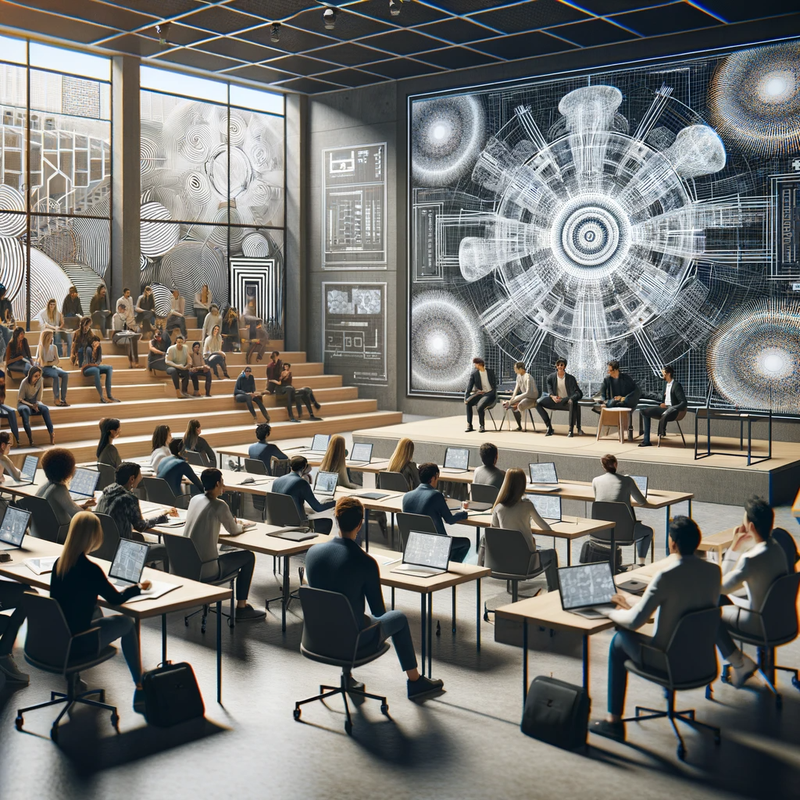AI in Architectural Education: Preparing the Next Generation
Advances in technology have long shaped architecture. In recent years, one of the most transformative technologies influencing architectural practice is Artificial Intelligence (AI). AI is changing how architects work and learn. This article explores how architectural education is evolving to incorporate AI concepts and technologies, ensuring that the next generation of architects is well-prepared for the AI-enhanced future of the profession.
The Traditional Architectural Education

Before delving into integrating AI into architectural education, it's essential to understand the traditional model of architectural education. Historically, architectural education focused on imparting fundamental skills and knowledge in design, construction, history, theory, and building technology. Students were required to perfect manual drafting, physical model-making, and critical thinking in design.
While these foundational skills remain crucial, the profession's evolving landscape demands that architectural education adapts to incorporate emerging technologies such as AI.
The Role of AI in Architecture
AI has found its way into various aspects of architectural practice, significantly influencing the design process, project management, sustainability analysis, and more. Educational institutions must introduce AI concepts and tools into their curricula to prepare future architects for this AI-enhanced landscape.
Generative Design and AI-Driven Creativity
One of the most notable applications of AI in architecture is generative design. AI-powered generative algorithms can create countless design variations based on input parameters and constraints. This speeds up the design process and encourages creative exploration by presenting architects with unconventional design solutions they might not have considered.
By integrating generative design into architectural education, students can learn how to harness the creative potential of AI. They gain insights into setting design criteria, interpreting AI-generated proposals, and refining designs based on AI-driven insights.
AI-Powered Sustainability Analysis
Sustainability is a critical concern in contemporary architecture. AI-driven tools can simulate and analyze various aspects of building performance, such as energy consumption, thermal comfort, and daylighting. These simulations help architects optimize designs for environmental sustainability and energy efficiency.
In architectural education, students can learn how to use AI-powered tools to assess the environmental impact of their designs. They can explore different design iterations and analyze how each affects sustainability metrics. This hands-on experience equips future architects with the skills to create environmentally responsible buildings.
Project Management and AI
AI is also revolutionizing project management within architecture. AI-powered project management tools can optimize scheduling, cost estimation, and risk assessment. By incorporating AI-driven project management concepts into their education, students can learn to use AI tools to streamline project workflows, improve efficiency, and reduce the risk of budget overruns and delays.
Integrating AI in Architectural Education

Integrating AI in architectural education can take various forms, each contributing to a well-rounded education that prepares students for an AI-enhanced profession.
AI-Centric Courses
Some architectural programs are introducing dedicated courses focused on AI in architecture. These courses cover fundamental AI concepts, including machine learning, deep learning, and neural networks. Students learn how AI algorithms work, how they can apply to architectural problems, and how to employ AI-powered design and analysis tools.
These courses also delve into the ethical and cultural considerations surrounding AI in architecture, emphasizing responsible AI use and the avoidance of biases in design.
Interdisciplinary Collaboration
AI's architectural role often requires collaboration with professionals from other fields, such as data scientists and AI engineers. Architectural education is increasingly encouraging interdisciplinary collaboration through joint projects and coursework.
By working with AI experts and professionals from other disciplines, architectural students gain exposure to different perspectives and methodologies. This collaboration fosters a deeper understanding of AI's potential and its applications beyond architecture.
AI-Enhanced Design Studios
Design studios are a cornerstone of architectural education, where students develop their design skills and creativity. AI-enhanced design studios integrate generative design tools and AI-powered simulations into the studio environment. Students learn to leverage AI to generate and evaluate design alternatives, fostering innovation in their design projects.
These studios encourage students to experiment with AI-generated design proposals, consider sustainability factors, and refine designs based on AI-driven insights. The result is a new generation of architects who are proficient in traditional design methods and adept at using AI as a creative tool.
Access to AI Tools and Resources
Architectural schools provide students with access to AI tools and resources through on-campus facilities or virtual environments. This includes access to AI-powered design software, computational resources for simulations, and training materials.
Access to these resources allows students to explore AI applications in architecture independently. They can experiment with AI algorithms, conduct research, and gain practical experience in applying AI concepts to architectural projects.
Ethical Considerations in AI Education

Incorporating AI into architectural education also entails addressing ethical considerations. AI algorithms can inadvertently perpetuate biases present in their training data, resulting in designs that unintentionally reinforce discriminatory or unethical practices. It is essential to instil ethical awareness in architectural students as they learn to work with AI.
Architectural education should include modules or discussions on the ethical implications of AI in design. This includes understanding the importance of ethical design, recognizing potential biases, and ensuring that AI-generated designs align with ethical and cultural values.
Preparing Future Architects for an AI-Enhanced Profession
Incorporating AI concepts and technologies into architectural education equips future architects with the skills and knowledge needed to thrive in an AI-enhanced profession. Here are some key benefits and outcomes of this approach:
Innovation and Creativity
Architectural education that integrates AI encourages innovation and creativity. Students learn to embrace AI as a tool that enhances their creative potential rather than replacing their role as designers. AI-powered generative design inspires students to be creative, explore unconventional solutions, and push the boundaries of architectural design.
Environmental Responsibility
Sustainability is a central concern in contemporary architecture. By teaching students how to use AI for sustainability analysis, architectural education contributes to a more environmentally responsible profession. We train future architects to design buildings that prioritize energy efficiency, environmental sustainability, and occupant well-being.
Efficiency and Project Management
AI-powered project management tools streamline workflows, improve efficiency, and reduce the risk of budget overruns and delays. Graduates who are proficient in AI-enhanced project management are well-prepared to navigate the complexities of real-world architectural projects.
Interdisciplinary Collaboration
Architectural education that encourages interdisciplinary collaboration prepares students for the reality of working in multidisciplinary teams. Future architects are more adaptable and open to collaborating with professionals from diverse fields, fostering a holistic approach to design and problem-solving.
Ethical Awareness
Architectural education with a focus on AI ethics cultivates ethical awareness among students. Graduates are more likely to prioritize ethical considerations in their designs, ensuring that AI-generated solutions align with cultural and ethical values.
Career Opportunities
Architects who are proficient in AI concepts and tools are more attractive to employers. They are well-equipped to work for firms that leverage AI for design, project management, and sustainability analysis. AI-savvy architects are better positioned to pursue careers in AI-driven design software development and research.
Real-World Examples
Several architectural schools and programs have already embraced AI in their curricula, serving as examples of how AI integrates into architectural education.
Massachusetts Institute of Technology (MIT)
MIT's School of Architecture and Planning offers a course titled "How to Make (Almost) Anything," which introduces students to digital fabrication technologies, including AI-powered design tools. Students learn to use AI-driven software to generate and fabricate intricate architectural components.
Bartlett School of Architecture, University College London
The Bartlett School of Architecture incorporates AI-driven generative design into its curriculum. Students take part in design studios that explore the creative potential of AI algorithms, encouraging them to experiment with AI-generated design proposals.
Harvard Graduate School of Design
Harvard's Graduate School of Design offers courses on the intersection of AI and architecture. These courses delve into AI concepts and their application allowing students to understand AI's potential in the field better.
Conclusion
Architectural education is evolving to prepare the next generation of architects for an AI-enhanced future. By integrating AI concepts and technologies into curricula, educational institutions are equipping students with the skills and knowledge needed to thrive in a profession where AI plays an increasingly pivotal role.
Future architects who are proficient in AI are more likely to drive innovation, prioritize sustainability, streamline project management, collaborate effectively in interdisciplinary teams, and uphold ethical standards in design. As AI advances, architectural education serves as a critical foundation for a profession that adapts to technology and shapes it to create more innovative, sustainable, and culturally sensitive built environments. The architects of tomorrow are not just designers; they are designers who leverage the power of AI to transform the world.
Our Services
View some of our most popular services below.











